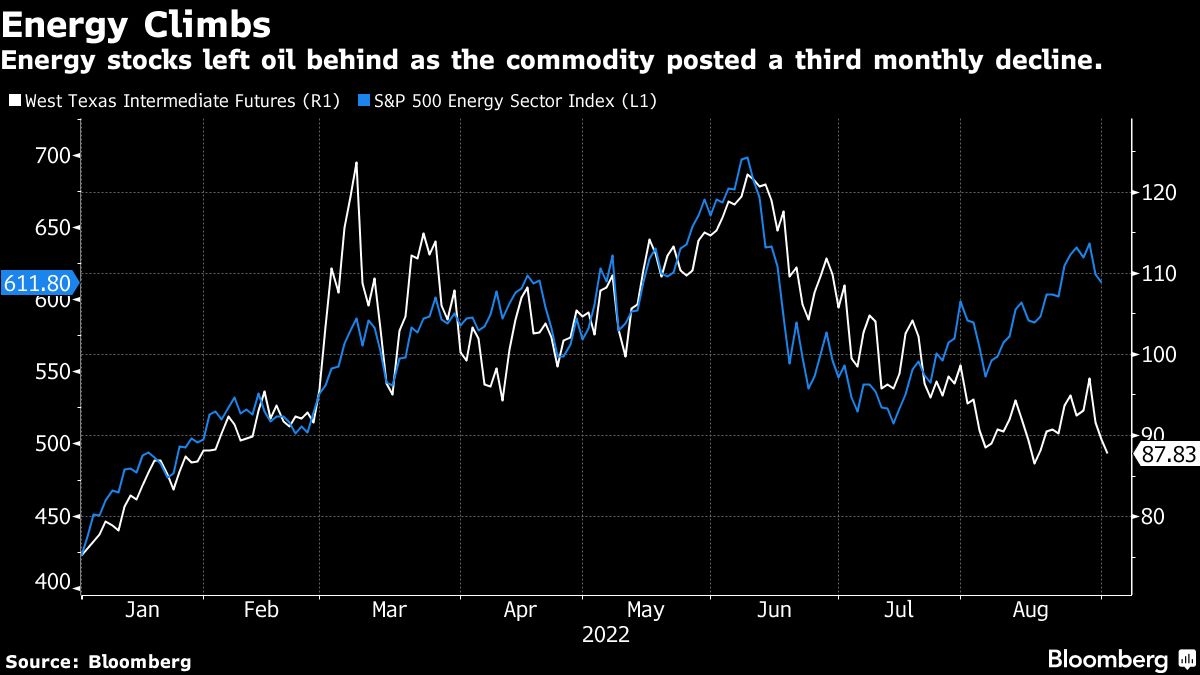Sep 1, 2022
BlackRock says energy is bright spot as it sours on stocks
, Bloomberg News
We prefer IG corporate bonds over stocks and TSX over U.S. markets: BlackRock's Reiman
BlackRock Inc.’s senior investment strategist Kurt Reiman says shares of oil and gas companies will continue to be a rare bright spot in an otherwise tough market, even as the asset manager downgrades its position on equities to underweight as central bankers signal further interest rate hikes.
Despite a looming recession, the asset manager expects demand for oil and other commodities to remain strong as Russia’s invasion of Ukraine -- and other such factors as under-investing and navigating materials in other geopolitically sensitive regions -- put pressure on supply following the initial shock from the easing up of pandemic restrictions.
“The confidence, in our view, around structurally higher commodity prices has risen over the course of the year,” Reiman said on Tuesday in an interview at Bloomberg’s Toronto office. “We now have a supply shock within a supply shock because of the war in Europe. Then when you think about the underinvestment in the key commodities that Russia and Ukraine export, it hasn’t been sufficient to meet global demand. And it takes a few years of investment to bring this capacity online.”
BlackRock shifted to an underweight stance on equities in July as central banks ramped up their aggressive interest rate hike campaigns, bucking the broader market that was shifting back into stocks in the midst of an earnings season where results topped analyst expectations. Those gains dwindled by the end of August as the threat of even higher interest rates and lower corporate guidance spooked investors.

An index of oil and gas companies in the S&P 500 index has surged 40 per cent this year, a stark contrast to the more than 18 per cent drop in the overall S&P 500. Occidental Petroleum Corp. soared 135 per cent this year, with Devon Energy Corp. and Exxon Mobil Corp. among the top five gainers.
Energy has weathered the downturn on elevated oil prices even as the commodity posted a third monthly decline, the longest losing streak in more than two years. Meanwhile, energy stocks flushed with cash marched higher as investors seek out safe havens in volatile markets.
Soon after making the change, stock markets rallied on better-than-expected earnings. But the surge was a blip as markets made a u-turn and spiraled last week after US Federal Reserve chair Jerome Powell warned that investors should brace for an extended period of higher rates.
Reiman said he expects the broader market to continue to decline until central banks start reversing their rate hikes, with shares of consumer and communications-focused technology companies bearing the brunt of the selloff.
“If they intend to bring inflation back down to their target of 2 per cent, it would, in our view involve a much greater hit to demand than stocks are currently priced for,” Reiman said. “Inflation and its effect on stocks is like air pressure in your tires -- you need some, but if you have too much or too little then you’ve got a problem.”











